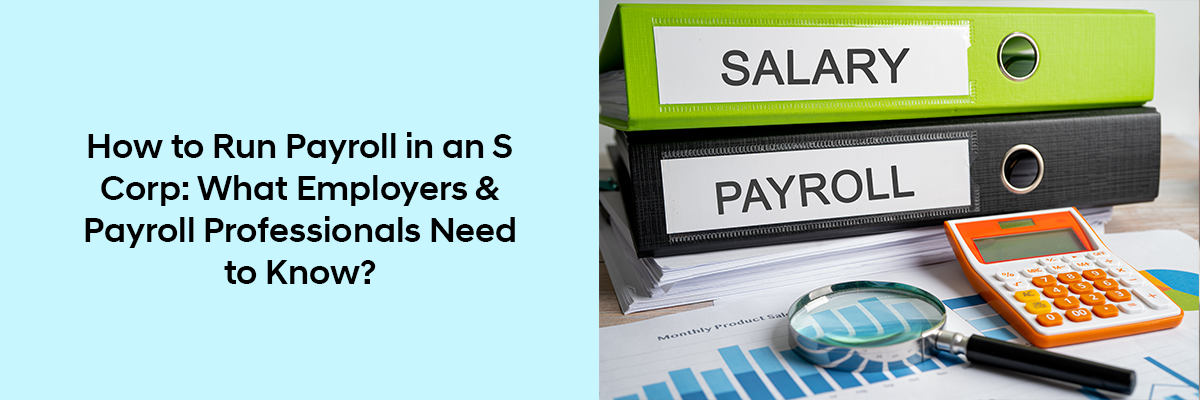Running payroll in an S Corporation (S Corp) is more than just paying employees. Unlike traditional corporations, S Corps do not pay corporate income tax. Instead, their profits and losses pass through to shareholders, who report them on their personal tax returns.
Because some shareholders also work as employees, S Corps must carefully separate wages (which are subject to payroll taxes) from profit distributions (which are not). The IRS closely monitors and If payroll is not handled correctly, an S Corp could face penalties, back taxes, and audits.
This guide covers everything employers and payroll professionals need to know about running payroll in an S Corp while ensuring compliance and transparency.



Who is Involved in Payroll in an S Corp?
S Corp payroll includes three groups of individuals:
- Regular Employees – These are non-owner employees who earn wages or salaries. Their compensation is subject to payroll taxes (Social Security, Medicare, and income tax withholding).
- Shareholder-Employees – These are owners who also work for the company. The IRS requires them to receive a reasonable salary before taking any profit distributions. Their wages are subject to payroll taxes, but their profit distributions are only subject to income tax.
- Shareholders (Non-Employees) – These are owners who do not work in the company. They only receive profit distributions, which are subject to income tax but not payroll taxes.
S Corps are limited to a maximum of 100 shareholders, including both employee and non-employee shareholders. Proper classification ensures compliance with IRS rules and prevents payroll tax issues.
The most important payroll rule in an S Corp is that shareholder-employees must be paid a fair salary before receiving distributions. The IRS watches for cases where S Corps underpay salaries to avoid payroll taxes and will reclassify distributions as wages if necessary, triggering back taxes and penalties.
IRS Payroll Rules for S Corps
To prevent tax abuse, the IRS requires S Corps to follow these payroll regulations:
- Pay shareholder-employees a reasonable salary – If a shareholder works in the business, they must be paid a salary comparable to industry standards before taking any profit distributions.
- Withhold and pay payroll taxes – Wages must be taxed for Social Security, Medicare, and income taxes, just like with regular employees.
- File payroll tax forms – S Corps must submit quarterly payroll tax reports and issue W-2s for wages and Schedule K-1 for profit distributions.
- Keep payroll and distributions separate – Shareholder salaries and profit distributions must be clearly documented and processed separately.
What the IRS Does Not Allow:
- Paying shareholder-employees only through distributions – If a working shareholder takes only distributions and no salary, the IRS can reclassify those payments as wages and demand unpaid payroll taxes.
- Underpaying shareholder salaries – If a shareholder-employee is paid below market rates, the IRS may increase their reported wages and require back payroll taxes to be paid.
- Misclassifying employees as independent contractors – The IRS penalizes businesses that misclassify workers to avoid payroll taxes.
Steps to Run Payroll in an S Corp
1) Classify Workers Correctly
- Regular Employees – Individuals who work for the company and earn only wages or salaries, subject to payroll taxes.
- Shareholder-Employees – Shareholders who also work for the company and receive both wages (subject to payroll taxes) and profit distributions (which are not subject to payroll taxes).
- Shareholders (Non-Employees) – Owners who do not work for the company and only receive profit distributions, which are subject to income tax but not payroll taxes.
- Independent Contractors – Individuals or businesses hired to provide services for the company, but they are not considered employees. Independent contractors are responsible for their own tax payments.
This classification determines how income is taxed and ensures proper payroll processing.
2) Set Up Payroll Processing
While it might seem obvious, using payroll software like QuickBooks, Gusto, or ADP is especially important for S Corps. These tools help ensure that wage payments, tax withholdings, and compliance filings are handled accurately. Processing payroll manually increases the risk of errors, and even small mistakes can attract IRS scrutiny or lead to penalties—something S Corps definitely want to avoid, given the strict payroll rules that apply to them.
3) Determine a Reasonable Salary for Shareholder-Employees
The salary for shareholder-employees must be reasonable and align with industry standards for similar roles. The IRS closely monitors this to ensure that salaries are not artificially lowered to avoid payroll taxes. To prevent audits or penalties, businesses should document how the salary was determined and be prepared to justify it if needed.
4) Withhold and Pay Payroll Taxes
Payroll taxes apply to all employee wages, including those of shareholder-employees in an S Corp. This is important because shareholder-employees are treated the same as regular employees when it comes to payroll taxes. These taxes include:
- Federal and state income taxes – Withheld from wages based on the applicable tax rates.
- Social Security and Medicare (FICA) – A total of 15.3%, with 7.65% withheld from the employee and the other 7.65% paid by the employer. It’s essential for the S Corps to correctly apply these taxes to both wages and distributions to avoid IRS penalties.
- Unemployment taxes (FUTA and SUTA) – Paid by the employer to cover federal and state unemployment benefits. S Corps must ensure they follow proper guidelines for these payments to maintain compliance.
5) File Payroll Tax Reports and Issue Required Forms
While the following forms are not unique to S Corps, S Corps must ensure they comply with these requirements to maintain payroll tax compliance:
- Form 941 – Filed quarterly by employers (including S Corps) to report wages, payroll taxes, and withholdings. This applies to both regular employees and shareholder-employees in S Corps.
- Form 940 – Filed annually to report and pay federal unemployment tax (FUTA). This is required by all employers, including S Corps, for both regular employees and shareholder-employees, as applicable.
- W-2 Forms – Issued to all employees, including shareholder-employees, at year-end. These forms report total wages and the taxes withheld throughout the year. S Corps, like any employer, must provide W-2s to their employees for wages paid (not distributions).
- Schedule K-1 – Issued to shareholders, including shareholder-employees, to report their share of the S Corp’s profits or losses. This form is specific to S Corps and is used by shareholders to report profit distributions on their personal tax returns. These distributions are not subject to payroll taxes but are subject to income tax.
6) Pay Profit Distributions Separately
Once a shareholder-employee has been paid a reasonable salary (as required by the IRS), they can receive additional income in the form of profit distributions. Unlike wages, these distributions are not subject to payroll taxes (Social Security, Medicare, and unemployment taxes) but are still subject to income tax on the shareholder’s personal tax return.
Maintaining a clear distinction between wages (reported on a W-2) and distributions (reported on Schedule K-1) is essential to avoid IRS scrutiny and potential reclassification of distributions as taxable wages.
7) Maintain Transparency and Documentation
To stay compliant and avoid IRS penalties, S Corps must keep clear and accurate records of payroll and profit distributions. Key practices include:
- Separating salaries and distributions – Clearly document wages paid to shareholder-employees and keep them distinct from profit distributions.
- Board approval for executive pay – Hold formal board meetings to review and approve compensation for executives and shareholder-employees, ensuring salaries align with industry standards.
- Maintaining payroll records – Keep detailed payroll records, including W-2s, tax filings, and distribution reports, to provide documentation in case of an IRS audit.
Proper documentation helps S Corps demonstrate compliance with IRS payroll rules and prevents potential
6) Payroll Compliance for Multi-State S Corps
S Corps with employees in multiple states must handle state-specific payroll taxes and registration requirements. Key points:
- State Taxes Vary – Payroll tax rates (income tax withholding, unemployment tax) differ by state.
- Business Registration – Some states require an S Corp to register as a foreign entity before running payroll there.
- Remote Shareholder-Employees – If a shareholder-employee works from another state, it may create a tax nexus, triggering additional state taxes.
Using payroll software or a service that supports multi-state compliance helps avoid errors and penalties.
Can Shareholder-Employees Be Involved in Payroll Decisions?
Yes, shareholder-employees, particularly those in executive roles like CEO, CFO, or COO, often play a role in setting payroll policies. However, to avoid conflicts of interest and IRS scrutiny, their compensation should:
- Be approved by the Board of Directors to ensure fairness and compliance.
- Align with industry standards to prevent IRS audits for underpayment.
- Be processed by payroll professionals or an external service rather than being managed directly by executives themselves.
This approach helps maintain payroll transparency, ensures IRS compliance, and upholds ethical business practices while still allowing key executives to participate in decision-making.
Can Shareholder-Employees Receive Bonuses?
Yes, shareholder-employees can receive bonuses, but they must be treated as regular wages, meaning they are:
- Subject to payroll taxes – Bonuses are taxed like regular wages, including Social Security, Medicare (FICA), and income tax withholding.
- Reported on W-2 forms – Bonuses must be included in total compensation and properly documented for tax purposes.
Example:
If a shareholder-employee earns a $100,000 salary and receives a $10,000 bonus, the bonus is taxed just like their regular wages. If an S Corp incorrectly classifies the bonus as a profit distribution to avoid payroll taxes, the IRS may reclassify it as wages and impose penalties for unpaid payroll taxes. To stay compliant, S Corps should always process shareholder-employee bonuses through payroll, just like any other employee bonus.
Expert-Led Payroll Webinars for You
This blog is designed to be informative and helpful, and we hope you gained valuable insights. If you’re interested in learning more about payroll-related topics, be sure to check out our Payroll Webinar page. There, you’ll find expert-led webinars covering essential topics like FMLA, payroll processing, accounting, labor laws, and more. Staying informed will help you maintain compliance and follow best payroll practices effectively.
Conclusion
Managing payroll in an S Corp requires balancing compliance with efficiency. Paying shareholder-employees a fair salary, handling payroll taxes correctly, and keeping wages separate from distributions are essential to avoid IRS scrutiny.
Staying informed on payroll regulations helps S Corps operate smoothly and minimize tax risks. For deeper insights, check out our Payroll Webinar page for expert-led sessions on payroll best practices and compliance.


